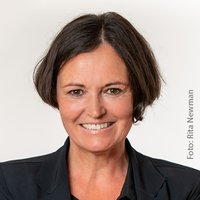AI: Game Changer in the Media and Film Sector?
Experts Discuss Chances and Risks of Artificial Intelligence at St. Pölten UAS’ c-tv Conference
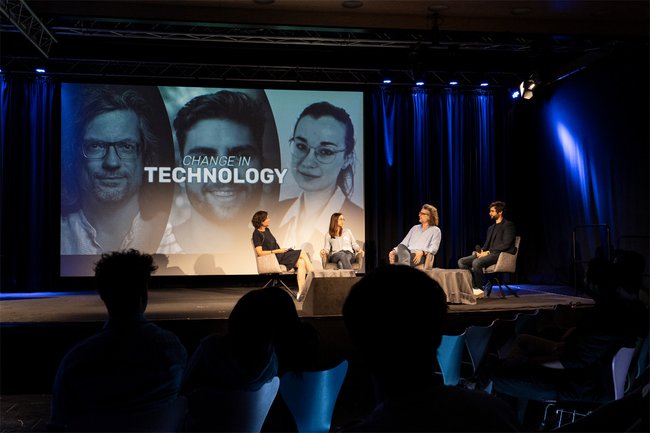
Doris Priesching (author; editor, Der Standard), Kerstin Lenger (data science consultant, EBCONT), Matthias Hornschuh (composer and spokesman of creative minds in the “Initiative Urheberrecht”), Djordje Slijepčević (researcher at the Institute for Creative\Media/Technologies, St. Pölten UAS) discuss the risks and opportunities of artificial intelligence in the film and media industry © Alexander Steininger
Will AI replace traditional career paths? Does it restrict creative freedoms, or does it promote innovation and creativity? The media and film industry discussed these questions at the 15th edition of the c-tv Conference of the St. Pölten UAS.
New technologies such as AI and the integration of cloud-based working methods are revolutionising the production and the collaboration in teams in the media and film sector. At the same time, this transition is also characterised by a cultural change and a rethinking of working conditions.
AI as Game Changer
“Generative AI in particular is a driver of this change”, says Rosa von Suess, conference head and Academic Director of the study programme Media Technology at the St. Pölten UAS. She was invited on stage by presenter Doris Priesching, author and editor of “Der Standard”, and by an AI-generated “colleague” whose performance could hardly be distinguished from that of a real person – to give but one example of what is already possible with AI. Yet there is so much more: “A study of 160 AI applications has demonstrated that AI can already write scripts and news texts as well as generate short videos entirely on its own – including music. Voices are cloned, and localisations such as the automated generation of subtitles are applied”, explains von Suess.
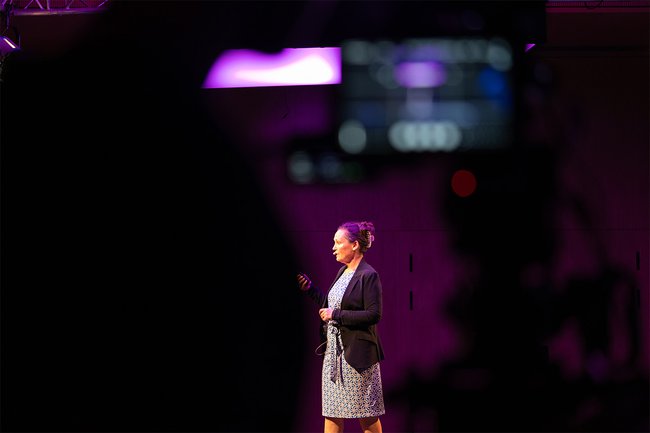
Academic Director of the study programme Media Technology at the St. Pölten UAS Rosa von Suess opened the c-tv Conference 2024 © Alexander Steininger
Room for Improvement and Potential for Future Players
Renowned experts from the media and film industry all agree that artificial intelligence will strongly influence the media and film industry yet. What is important in this context is that we learn how to professionally handle the technology. This is where the experts see room for improvement and potential for future players in the media and film sector.
“One the one hand, the young generation of media producers have to familiarise themselves with AI solutions in order to remain fit for the future. On the other hand, they have to identify areas where creativity is particularly important”, emphasises Philipp Eibl, head of the group for Media Production Software at the Fraunhofer Institute for Integrated Circuits. In the project “Post-pro Cloud“, he and his team develop AI tools for a cloud-based localisation assistant. In connection with the film mastering software easyDCP also developed by this group, the idea is to gradually evaluate and harness solutions for accessibility, transcription, and translation.
Various degree programmes in the field of media at the St. Pölten UAS deal with diverse aspects of AI and train students to become professionals with comprehensive know-how. “For our Media Technology students in particular, the use of AI is indispensable and an important expertise for their future”, says Rosa von Suess, Academic Director of this programme.
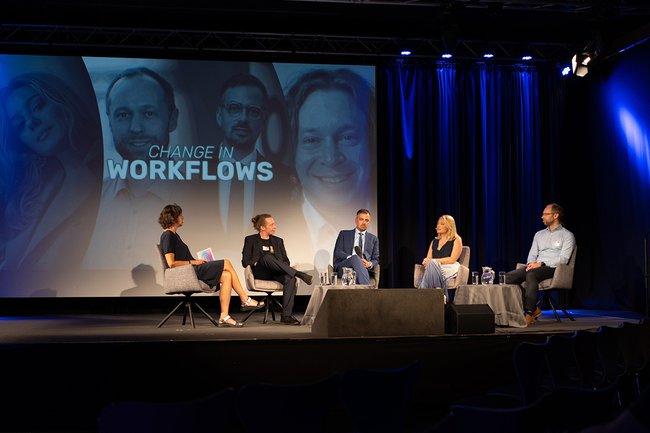
Experts see room for improvement and potential for future players in the media and film industry. In conversation (from left): Doris Priesching (author; editor, Der Standard), Lukas Strummer (Managing Director, creareX GmbH), Stefan Kollinger (Innovation Officer, ORF), Stephanie Meisl (Media Artist, Co-Founder D'AVANTGARDE), Phillip Eibl (Head of the Media Production Software Group, Fraunhofer IIS) © Alexander Steininger
Field of Tension between AI & Society
Matthias Hornschuh regards the technological developments critically in terms of their implications for creative processes in culture and media. The composer and spokesman of creative minds in the “Initiative Urheberrecht”, which addresses the societal and media impact of artificial intelligence, urgently warns of the implications of unregulated AI for art and society. “I am not against AI; what I ask for is not a driving ban but rather a set of traffic rules, as it were. We need regulations that impose limits on what AI is allowed to do. The gap between political control and technological advance is becoming uncontrollably wide, and we should not put up with that.”
Otherwise, Hornschuh believes, we run the risk of tipping the balance in the ecosystem of our creative industry. “Cultural work is professional, paid work that people do to make a living. If, for example, sound studios can no longer be maintained, then those that supply these studios can no longer survive, either.” According to him, we must not forget that artificial intelligence essentially means autocomplete systems – or in other words, statistics machines. “They can assist us, yes, but we are the creative ones”, says Hornschuh, providing further food for thought: “Maybe we will need something like a fairtrade seal for human-made cultural goods.” But what can society do right now to send a signal here? “The big players use all our data and works in order to train their models. We have to decide whether, when, and under what conditions we let them have our information.”
Change in Crews
However, it is not only AI that is changing the media and film industry – rather, a cultural change and rethinking in terms of working conditions are likewise under way. “We have come a long way – a lot of preventive work and raising of awareness have been achieved under the keywork ‘me too’ in the past few years – but we have yet to reach our goal”, stresses Claudia Wohlgenannt, film producer, member of the board of the Akademie des Österreichischen Films, and member of the representation of the film and music industry in the Chamber of Commerce of Vienna. The 60-hour working week in particular continues to be a big problem and contributes to the fact that people tend to leave the industry when they start a family. “Shared jobs could be an unbureaucratic solution to this problem. For example, two make-up artists could decide to bear their working hours and workload together”, Claudia Wohlgenannt is convinced.
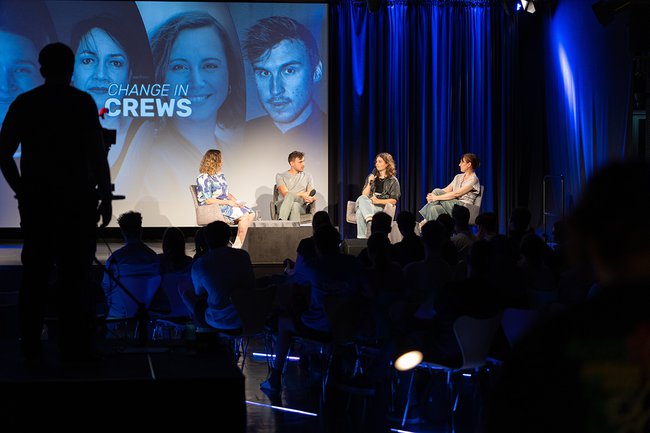
But it's not just AI that is changing the media and film industry, there is also a cultural change and a rethink in terms of working conditions, according to the experts (from left): Katharina Haudum (actress & co-founder of Drehübung/Vienna), Tobias Steiner (producer and assistant director), Tanja Ploner (producer, Women's Business), Claudia Wohlgenannt (film producer, member of the board of the Akademie des Österreichischen Films, and member of the representation of the film and music industry in the Chamber of Commerce of Vienna) © Alexander Steininger
Recording of the Conference
The conference was recorded by the team of c-tv consisting of students and lecturers of the study programme Media Technology. The event was streamed live via “Der Standard”, and a recording is available on the conference website.
